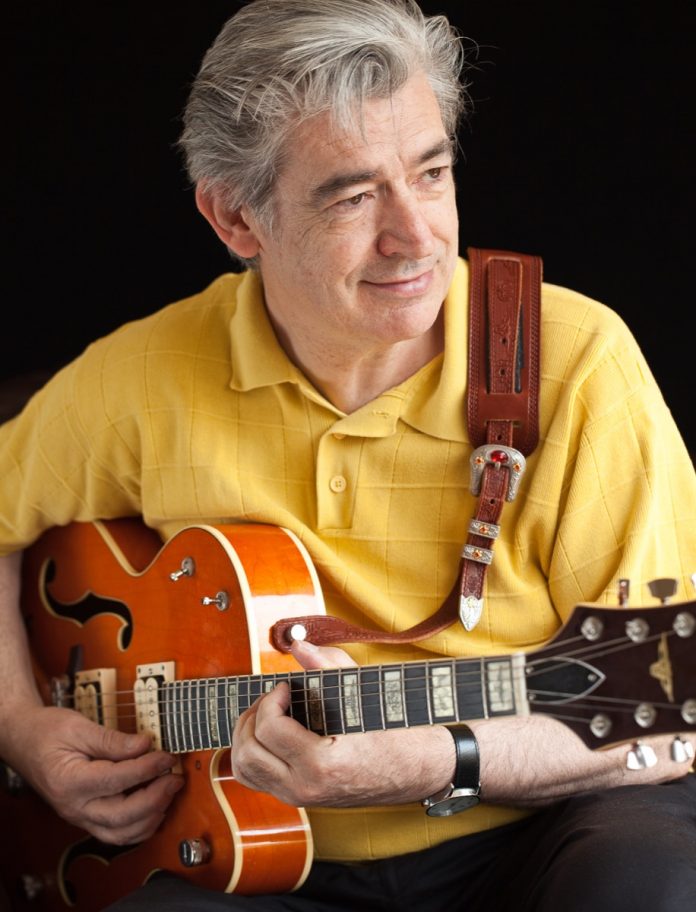There are few musicians who appear at home in almost every genre, but Chris Spedding is one of those rare exceptions. As a go-to guitarist and all-purpose session man, he has earned a deserved reputation as a jack of all riffs, licks and hook-lines.
He exhibited a flair for music-making in his early boyhood. “At age nine, my parents bought me a violin and sent me for lessons and I joined the school orchestra. This was 1953, before the advent of rock ’n’ roll. When the Elvis bug bit (around 1956), I was 12 and I wanted a guitar. My parents sent me to a local Sheffield jazz guitarist called Len Stewart for more appropriate lessons – even though they were classical music people and wouldn’t even listen to Bing Crosby. After being exposed to the pop music of the day – Buddy Holly, Elvis Presley, Eddie Cochran – Len turned me on to Charlie Christian and Barney Kessel, and I became a bit of a jazz snob for a while.”
Spedding developed an appreciation of guitarists of all persuasions – Albert King, Chuck Berry, Jeff Beck and, especially, Jimi Hendrix: “The ultimate guitar virtuoso. The others were great stylists, but Jimi was the ultimate guitar virtuoso. It would be impossible to pin him down to one specific style. There are just so many aspects to his work.”
He was beginning to make a name for himself by the time he joined Pete Brown and his Battered Ornaments. In 1969 they recorded their debut album, A Meal You Can Shake Hands With In The Dark, for EMI’s progressive Harvest label. The imprint soon became home to some of the most excruciating and exhilarating exponents dwelling on the outside edge of modern music.
Brown had tasted success as lyricist with blues-rock power trio Cream and was eager to make his own mark upon the music scene with whatever disparate musos volunteered their services. The album throughout possesses an element of inventive acumen that borders on insanity and like many Harvest releases should probably have been issued with a warning sticker for listeners of a nervous disposition. Spedding makes his songwriting debut with the wistful Station Song, abetted by Brown’s typically surreal lyrics which conjure up trainspotters acid tripping on the footplate of the Titfield Thunderbolt. “I must credit Pete with getting me to write my first song”, admits Spedding. Instilling the man with such confidence was to prove advantageous.
The release of the Battered Ornaments debut was followed a few weeks later by Our Point Of View from the Frank Ricotti Quartet, issued on the CBS Realm Jazz Series label. “I worked a lot with Frank Ricotti. We had a band in the mid-60s when we were both still teenagers. Later we formed a band based on the Gary Burton/Larry Coryell group and that was the outfit that became the Frank Ricotti Quartet.”
Besides vibraphonist Ricotti and Spedding, the quartet also featured Chris Laurence on double bass and Bryan Spring on drums. This little-known one-off album by the quartet slipped between the cracks in the backdrop almost as soon as it was released and more’s the pity. It exhibits the virtues of contemporary jazz when infused with an exuberant feel-good factor, and the duetting between Spedding and Ricotti (sometimes doubling on alto sax) is never less than gratifying. There is a consistency here throughout the ensemble playing that contrasts acutely with that of the Battered Ornaments!
Back among the Battered Ornaments, things were not quite so ship-shape nor blissfully well fashioned, and even if the band admired Brown’s wordsmithery, his singing left much to be desired. “When we were in the process of recording the second Battered Ornaments album, Mantle Piece, the band had a democratic vote to ask him to leave because we didn’t like his singing. I think only one band member voted to keep him, so he eventually left and formed Piblokto. The irony was that no one in the Ornaments was any better at singing than Pete was!”
It fell to Spedding to take over vocal duties, and even if he was little better than Brown, at least he cranked the level of commitment up to eleven. Yes, for the most part this album sounds like laughter in the wind – it’s an uneasy sleeper in parts and overall Mantle Piece is not so much a group effort as an effort to be a group struggling to maintain quality control, but is is not without its treasures. To harken to the lunacy of Late Into The Night, the beer-swilling, bar-room stomp of Staggered, or the mock-turtle pathos of My Love’s Gone Far Away will gladden the heart.
“After Mantle Piece the band quickly drifted apart. I thought they were all crazy to pass up a recording contract with EMI/Harvest and the opportunity to record at Abbey Road studios, but the obligation to deliver ‘product’ for EMI fell to me. I became a solo singer/songwriter by default and started writing and singing my own songs.”

